The healthiest foods are those that supply your body with nutrients that support bodily functions and promote good health while not subjecting your body to harmful compounds. The healthiest foods include an array of vegetables, fruits, nuts, seeds, eggs, and some dairy products, but exclude red meats and highly processed items.

Below is a list of 15 of the healthiest foods you can incorporate into your diet to promote good health.
- Onion
- Avocado
- Pomegranate
- Chia seeds
- Salmon
- Eggs
- Kiwi
- Lentils
- Kefir
- Garlic
- Walnut
- Pistachio
- Brussels sprouts
- Blackcurrants
- Olives
Choosing healthy foods to include in your diet requires an assessment of their nutrient profile. Opt for foods that provide the most nutrients while adding variety to your diet. Some foods may be nutritious but come with potential health risks if you eat them in excess (such as cheese), so be sure to consume everything in moderation.
Below is a comprehensive summary of the 15 healthiest foods to eat as part of a balanced diet, along with some guidelines for structuring your meals.
1. Onion
Onions are vegetables from the allium family, along with garlic, shallots, and leeks. They are a staple ingredient in cuisines around the world, where they enhance the flavor of countless dishes.
View in gallery
Onions are a good source of fiber, vitamin C, and antioxidants. Additionally, they contain quercetin, an antioxidant with anti-inflammatory and antihistamine properties. Meanwhile, their prebiotic effects support the growth of beneficial gut bacteria.
Onions are well-tolerated by most people, and you can enjoy them often. For optimal health benefits, include about 1/4 – 1/2 cup of onion into your meals 5-6 days per week. That said, raw onions have a sharp, pungent flavor. If you find onions’ flavor too strong, try incorporating them into cooked dishes where their flavor will mellow. Additionally, individuals with digestive sensitivities may experience gas or bloating due to the natural sugars present in onions. If you experience discomfort, start with smaller portions or reduce your intake of this vegetable.
You can eat onions in various dishes, both raw and cooked. If you prefer raw onions, chop them and add them to salads, sandwiches, and salsas for a sharp, pungent flavor. Or, sauté onions to create a sweet, caramelized base for your soups, sauces, and stews. Finally, you can roast onions to mellow their flavor and bring out a natural sweetness – roasted onions are perfect additions to sandwiches, hamburgers, or pasta.
Choose onions that feel firm and heavy and have dry, papery skin. Store your onions in a cool, dark, and well-ventilated area – this will prolong their shelf life.
2. Avocado
Avocados are creamy fruits with a rich, buttery texture and a mild, nutty flavor.
View in gallery
Avocados are packed with nutrients, so they offer three key health benefits. Firstly, they’re an excellent source of healthy monounsaturated fats, which are thought to improve heart health by lowering LDL (“bad”) cholesterol and increasing HDL (“good”) cholesterol levels. Moreover, avocados are a major source of fiber, which supports digestive health, helps remove bad cholesterol from the body, and promotes satiety. Finally, avocados contain beneficial vitamins and minerals. For example, potassium helps regulate blood pressure, vitamin E acts as an antioxidant, and folate is essential for cell growth and development.
You can consume avocados freely as part of a healthy diet. To reap their nutritional benefits to the fullest, aim to include a 1/2 – 1 whole avocado in your meals 2-3 times per week. That said, avocados have a high-fat content, which makes them more calorie-dense than other fruits. So, mind the portion sizes if weight management is one of your goals.
You can eat an avocado directly from the skin, mash it into guacamole, spread it on toast, or use it as a creamy base for salad dressings or smoothies.
When choosing avocados, look for fruits that yield to gentle pressure – this indicates ripeness. If the avocado is too firm, let it ripen at room temperature for a few days. Store ripe avocados in the refrigerator to extend their shelf life.
3. Pomegranate
Pomegranates are dark-red-colored fruits with leathery skin and a multitude of juicy, ruby-red arils inside. The arils have a unique, sweet-sour flavor and offer a variety of health benefits thanks to their nutrient profile.
View in gallery
Pomegranate arils are a rich source of antioxidants, which include punicalagin, anthocyanins, and ellagic acid. These antioxidants protect cells from damage caused by free radicals, in turn helping avoid heart disease, inflammation, and cancer (particularly prostate cancer, according to studies).
Pomegranates are safe, so you can eat them in moderation as part of a balanced diet. That said, while the pomegranate arils are not high in sugar, commercially sold pomegranate juice often contains lots of added sugar. So, opt for fresh pomegranate arils over processed juices for the most health benefits.
You can add pomegranate arils to different dishes or eat them on their own. For example, you can sprinkle the arils on salads, yogurt parfaits, or oatmeal, add them to smoothies, or enjoy them on their own as a snack.
When choosing pomegranate, opt for heavy fruits with smooth, unblemished skin. Store your pomegranates in a cool, dry place short-term, or refrigerate them to increase their shelf life.
4. Chia seeds
Chia seeds are small, oval-shaped seeds from the Salvia hispanica plant, which is a member of the mint family.
View in gallery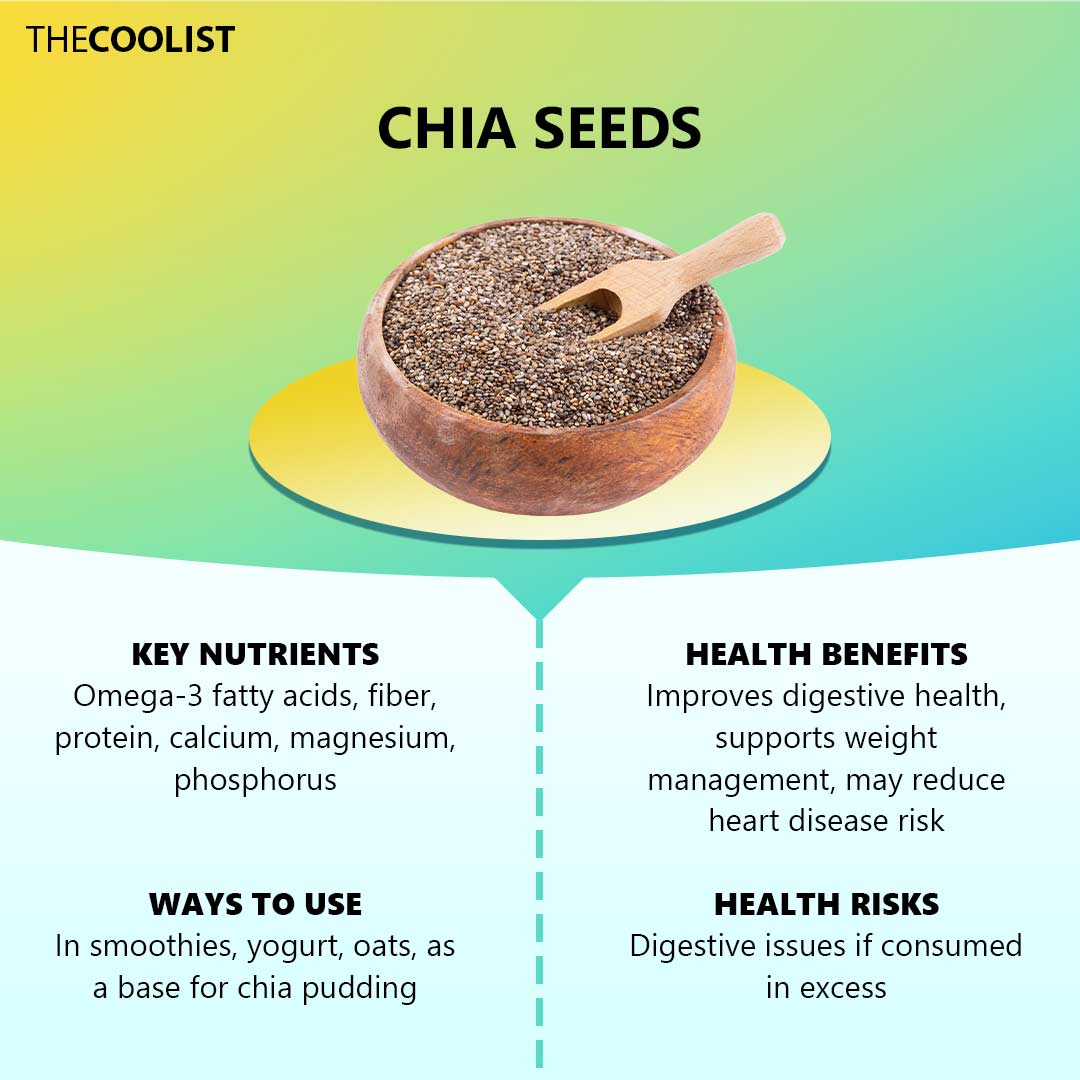
Chia seeds’ nutrient content offers three crucial health benefits. Firstly, these seeds are an excellent source of omega-3 fatty acids, particularly ALA (alpha-linolenic acid), which promotes heart and brain health. Secondly, they are a rich source of fiber, which supports digestive and cardiovascular health, helps you feel full longer, and regulates blood sugar levels. Finally, chia seeds offer lots of protein along with essential minerals like calcium, magnesium, and phosphorus – these support bone health, nerve function, and overall well-being.
Including chia seeds in your diet regularly is safe. To take advantage of their health benefits, incorporate 1-2 tablespoons of chia seeds into your meals 3-4 times per week. You can sprinkle them on yogurt or salads, add them to smoothies, or soak them in liquid to create a gelatinous chia pudding.
When buying chia seeds, look for dry, loose seeds without clumping – this could indicate moisture exposure. Store chia seeds in an airtight container in a cool, dry place to extend their shelf life.
5. Salmon
Salmon is a fish that belongs to the Salmonidae family. Several species of salmon exist, including Atlantic salmon, Chinook salmon, Coho salmon, and Sockeye salmon.
View in gallery
Salmon has a high concentration of omega-3 fatty acids. These healthy fats support heart health by lowering blood pressure, reducing triglyceride levels, and minimizing inflammation. In addition, omega-3 fatty acids found in salmon aid brain function by supporting memory and focus.
However, you shouldn’t eat salmon every day because this fish contains trace amounts of mercury. Mercury is a heavy metal that can be harmful to humans, especially during developmental stages. High levels of mercury exposure negatively affect the nervous system and cause issues with coordination, vision, and cognitive function. Salmon has relatively low mercury levels compared to species like swordfish and king mackerel, but you should still be mindful of how much salmon you eat. The FDA recommends limiting salmon consumption to 2-3 portions per week.
There’s no shortage of ways to add salmon to your diet. For example, you can incorporate flaked salmon into salads and omelets, make salmon burgers, or bake or grill salmon steaks in a simple marinade of olive oil, salt, and pepper. Meanwhile, smoked salmon brings a delightful savory element to bagels, dips, and charcuterie boards.
6. Eggs
Eggs are shell-encased embryos of poultry species, usually chickens or ducks. They are a staple food in many cultures around the world.
View in gallery
Eggs contain three key nutrient groups, and this nutritional composition offers major health benefits. Firstly, eggs are a source of high-quality protein, and contain all the essential amino acids your body needs for muscle growth and repair. Moreover, they’re packed with an array of vitamins and minerals that include choline, vitamin D, vitamin B12, and selenium. Choline aids brain development and function, vitamin D supports bones and the immune system, and selenium is an antioxidant that protects cells from damage. Finally, eggs contain lutein and zeaxanthin, antioxidants that promote eye health and curb the risk of age-related macular degeneration.
It’s safe to eat eggs in moderation if you’re a healthy adult. As a general guideline, aim for 1-2 eggs at a time, 2-3 times per week. That said, if you have high LDL cholesterol or heart disease, you should minimize egg intake, and avoid them altogether if you have an egg allergy.
Frying, poaching, and boiling eggs lets you create a wide assortment of dishes. For example, scrambled eggs topped with cheese or vegetables are a classic breakfast option. Likewise, an over-easy fried egg adds a nutrient-rich component to sandwiches and salads. Omelets are highly customizable—fold in cheese, meats, vegetables, or herbs to make the omelet your own. Poached eggs have a delicate texture and a runny yolk, which makes them ideal for topping avocado toast or adding to a bed of greens. Finally, hard-boil your eggs for a quick, easy snack or to add some protein to your green salad.
Eggs spoil quickly when they’re not refrigerated, so be sure to test their quality before adding them to your meals. Try this spoiled egg test to find out if your eggs are fresh enough to consume.
7. Kiwi
Kiwi fruit (also known as “kiwifruit” or “Chinese gooseberry”) is a small, fuzzy fruit with green or golden flesh and a sweet-tangy flavor.
View in gallery
Kiwis’ nutrient profile contains three elements that benefit your health. Firstly, kiwis are an excellent source of vitamin C, which is essential for boosting your immune system and promoting skin health. Secondly, kiwis are rich in dietary fiber, which regulates digestion and promotes gut and cardiovascular health. Finally, this fuzzy fruit contains potassium and vitamin K. Potassium is a mineral that helps control blood pressure, while vitamin K aids blood clotting and supports strong bones.
There are no health hazards that would restrict kiwi consumption unless you’re allergic to the fruit. Eating kiwi fruits daily is perfectly safe and a great way to boost your nutrient intake. However, stay away from kiwis altogether if you are allergic, as eating the fruit could cause anaphylaxis – a potentially fatal allergic reaction.
For example, you can add sliced kiwi to smoothies, yogurt parfaits, or fruit salads, as well as baked goods, sauces, salsas. Alternatively, try using it as a topping for grilled meats or fish.
When buying kiwis, select firm fruits that yield slightly to pressure. Allow the firmest fruits to ripen at room temperature if needed.
8. Lentils
Lentils are small, lens-shaped legumes that come in brown, green, red, and black colors.
View in gallery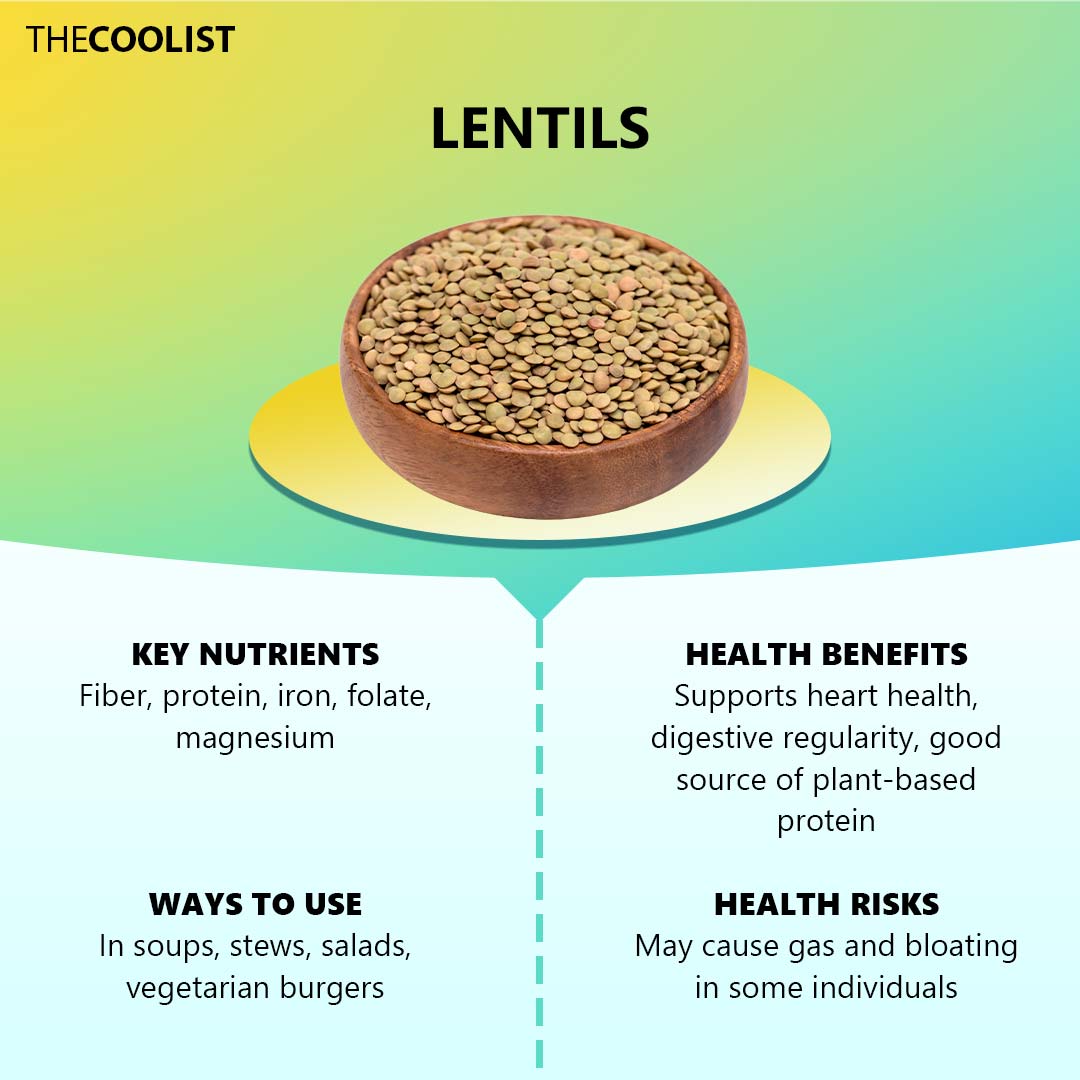
Lentils offer a rich source of plant-based protein, fiber, vitamins, and minerals. For example, lentils contain iron, which helps transport oxygen throughout the body via the circulation system. Likewise, lentils pack a good amount of folate, which aids cell growth and development (especially during pregnancy). Finally, these legumes are a source of magnesium, potassium, and zinc – minerals that promote heart health and nerve function.
Aim to include a 1/2 cup serving of cooked lentils in your diet 3-4 times per week. Most people tolerate lentils without issue, but you may experience gas or bloating due to their high fiber content if you have a sensitive stomach. Start with smaller portions, then introduce lentils into your diet more frequently to give your digestive system time to adjust.
You can add lentils to soups, stews, salads, vegetarian burgers, or lentil loaf, or puree them into creamy dips. When preparing lentils, start by rinsing them to remove any debris. However, unlike dried beans, lentils don’t always require pre-soaking. Simmer lentils in broth or water until tender – cooking times vary slightly depending on the specific type of lentil.
9. Kefir
Kefir is a fermented milk drink with a slightly tangy, yogurt-like flavor. It’s made by adding kefir grains (a combination of yeast and bacteria) to milk.
View in gallery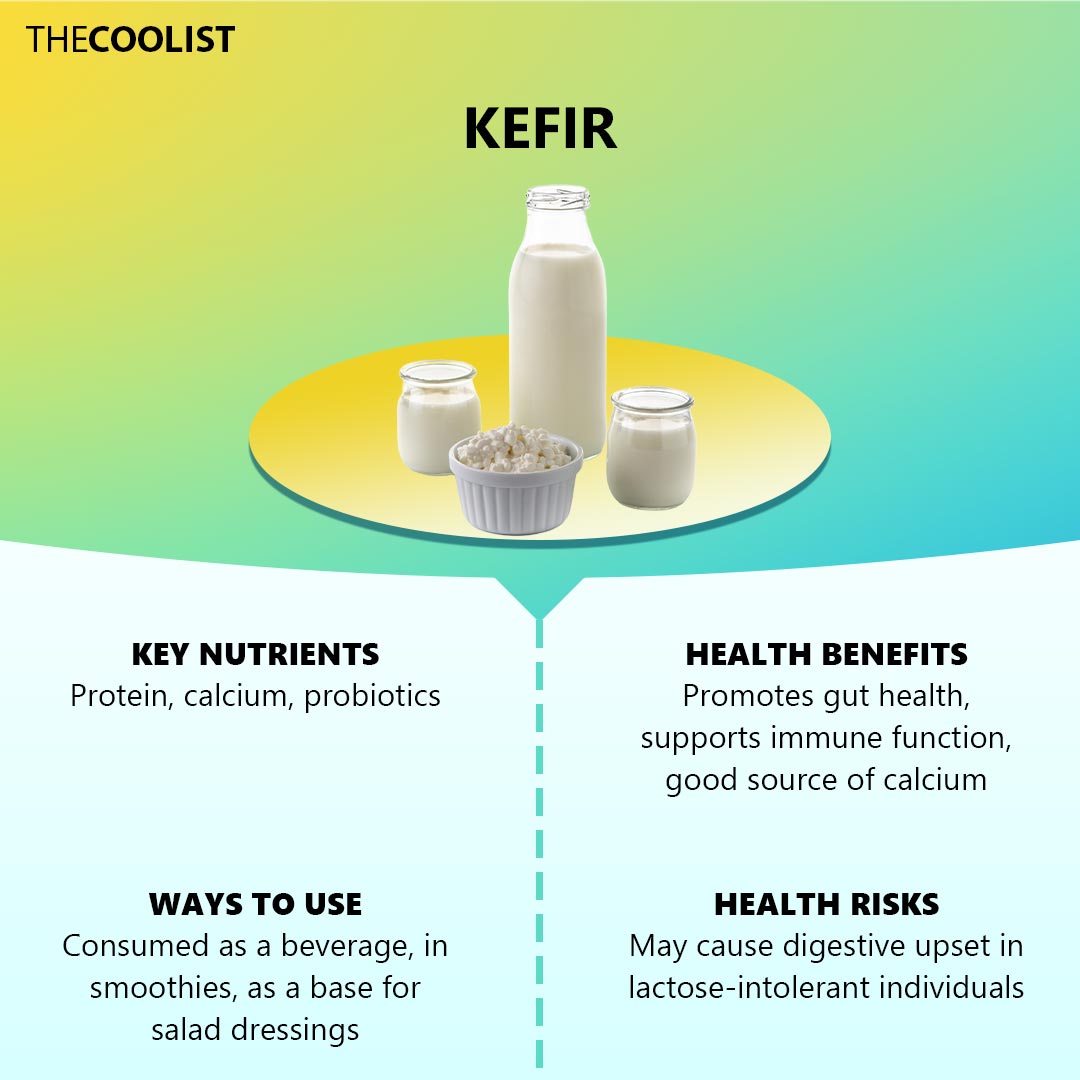
Kefir offers three major health benefits. Firstly, the probiotics (live microorganisms) in kefir support gut health, boost digestion, and improve immune function. Secondly, kefir is a good source of calcium – an important mineral for strong bones and teeth. Finally, kefir is rich in protein, which is essential for building and repairing body tissue.
For optimal gut health benefits, include about 1/2 – 1 cup of kefir in your diet on most days. Kefir isn’t known to cause any health risks. That said, may have trouble digesting dairy-based kefir if you have lactose intolerance. In this case, consider trying a water kefir (made with non-dairy bases), which still offers probiotic benefits.
You can drink kefir on its own, add it to smoothies, or use it as a base for dips and salad dressings.
When choosing kefir, always look for varieties with minimal (or zero) added sugar for the most health benefits. You can try making homemade kefir by adding kefir grains to milk. The grains should have the fermentation instructions on the package when you buy them.
10. Garlic
Garlic is a flavorful, pungent bulb commonly used in cuisines worldwide. It’s a member of the allium family, which also includes onions, shallots, and leeks.
View in gallery
Garlic has antibacterial, antiviral, and antifungal properties thanks to the compound allicin, which it contains. Moreover, medical research suggests that garlic promotes cardiovascular health by reducing blood pressure and cholesterol levels. That said, more studies are needed to confirm these findings.
Moderate amounts of garlic (about 1-2 cloves daily) are safe for most people. However, it may cause digestive upset if you have a sensitive stomach or a condition like irritable bowel syndrome (IBS). This irritation is caused by allicin, the same compound responsible for garlic’s health benefits. When garlic reaches the intestines, allicin can irritate the digestive lining and cause symptoms like gas, bloating, heartburn, and stomach cramps. Additionally, garlic has blood-thinning properties. If you take blood-thinning medications, consult your doctor before consuming large amounts of garlic to avert your risk of bleeding.
You can add minced or crushed garlic to sauces, salad dressings, stir-fries, marinades, soups, and stews for a savory depth of flavor. Roast whole garlic cloves for a mellow, sweet flavor that can be spread on bread, used in dips, or even eaten on their own. If you feel digestive discomfort after eating garlic, reduce your portions, try cooking instead of eating it raw, or use garlic-infused oil instead of garlic itself.
When selecting garlic, choose bulbs that are firm, plump, and have unbroken papery skin. Store garlic in a cool, dry, and well-ventilated area to prolong its shelf life.
11. Walnut
Walnuts are edible, shell-enclosed seeds from the walnut tree. They have a rich, slightly bitter flavor, and are highly nutritious.
View in gallery
Walnuts offer three nutrients that are beneficial for health. Firstly, they are an excellent source of healthy fats, and omega-3 fatty acids in particular. These fats improve heart health by reducing inflammation, lowering cholesterol levels, and decreasing blood pressure. Secondly, walnuts contain lots of fiber, which supports healthy digestion, bowel function, and cardiovascular health. Finally, walnuts are packed with protein, essential vitamins, and minerals like copper and manganese, all of which support various bodily functions.
You can eat walnuts freely as part of a balanced diet. For optimal health benefits, include a handful (about 1 ounce) most days of the week. However, be mindful of portion sizes, especially if watching your calorie intake – walnuts have a high fat content.
You can eat walnuts whole, chop and sprinkle them over salads, yogurt, or oatmeal, or add them to muffins and breads.
Choose walnuts with intact shells and those that feel heavy for their size. Store unshelled walnuts in an airtight container in a cool, dark place to keep them fresh longer.
12. Pistachios
Pistachios are edible seeds from the pistachio tree. They have a greenish kernel, a hard, beige shell, and a mildly sweet and nutty flavor.
View in gallery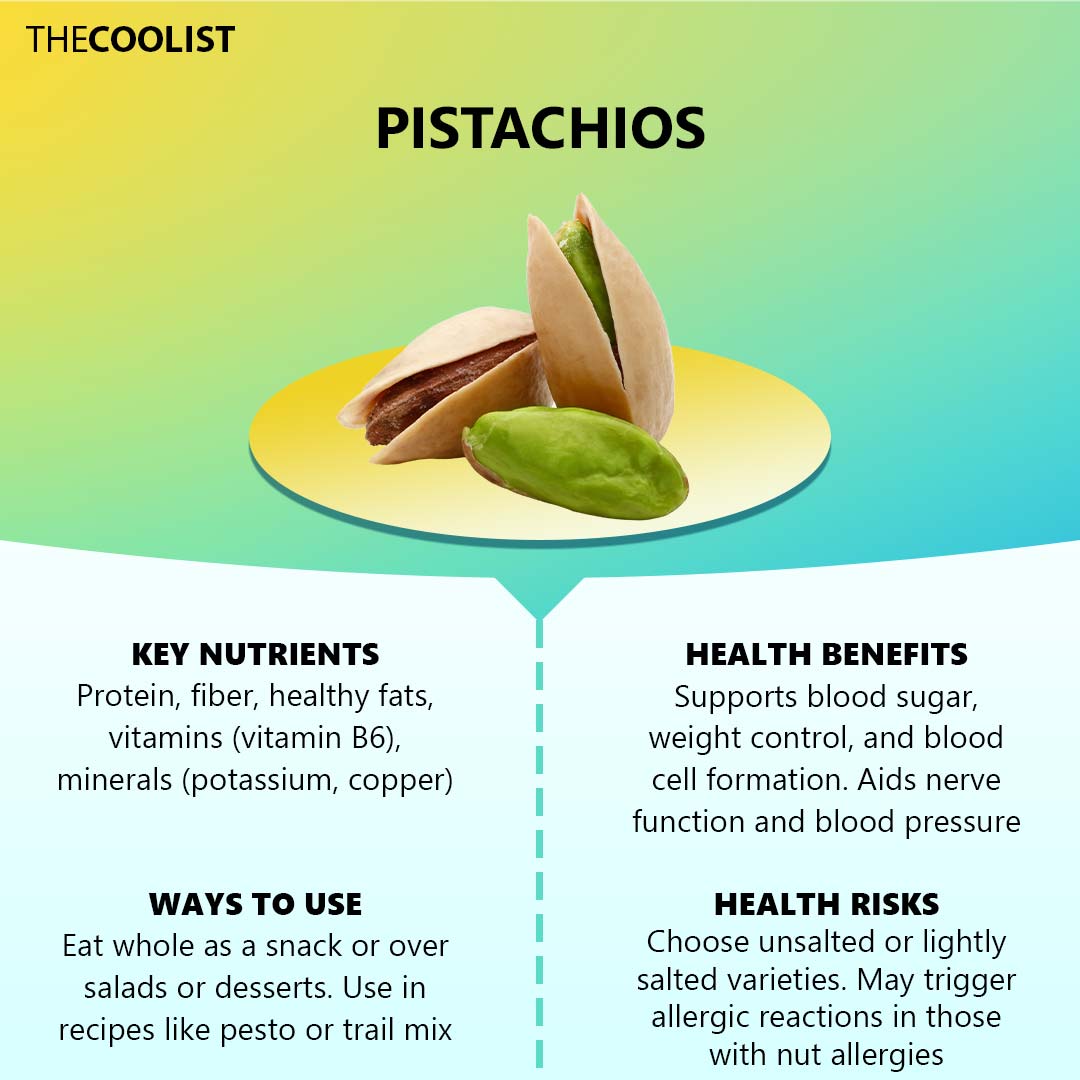
Pistachios are packed with protein, fiber, healthy fats, and numerous vitamins and minerals. Studies suggest that pistachios’ high fiber and protein content helps manage blood sugar levels and promote weight management. Meanwhile, their healthy fats aid cardiovascular and brain function. Finally, pistachios are loaded with vitamin B6, copper, and potassium, which promote healthy blood cell formation, nerve function, and blood pressure control, respectively.
You can safely eat about a handful (about 1 ounce) of pistachios most days of the week. If you are watching your salt intake, choose unsalted or lightly salted varieties. That said, reduce the portions a bit if you’re watching your weight, as these seeds have a high fat content.
Pistachios make a delicious snack and work well when you chop and sprinkle them over salads or desserts.
Opt for pistachios that are still in their shells, but are slightly opened for easy removal. For maximum freshness, store shelled pistachios in an airtight container in a cool, dark place.
13. Brussels sprouts
Brussels sprouts are small, cabbage-like vegetables that belong to the cruciferous vegetable family. These veggies have a strong flavor that not everyone finds appetizing, but they provide a wealth of nutrients.
View in gallery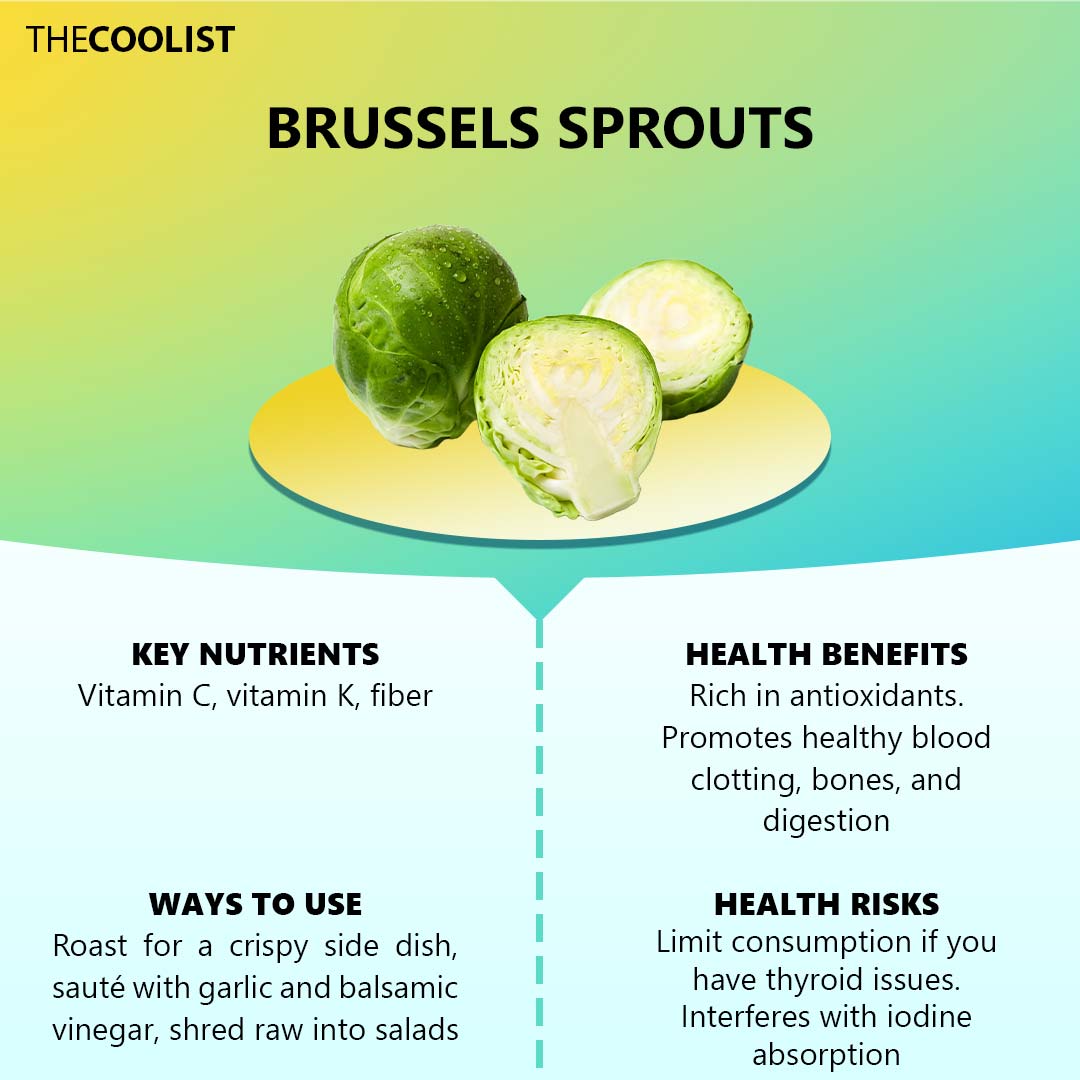
Brussels sprouts boast three crucial health benefits that stem from their nutrient profile. Firstly, they are an excellent source of vitamin C, which promotes a strong immune system and protects against cellular damage caused by free radicals. Secondly, they’re rich in vitamin K, which aids blood clotting and is essential for bone strength. Finally, Brussels sprouts contain plenty of fiber, which supports digestive and cardiovascular health and reduces the risk of certain cancers.
It’s safe to consume Brussels sprouts several times per week if you’re a healthy adult. However, reduce your consumption or avoid this vegetable altogether if you have thyroid issues, as cruciferous vegetables interfere with iodine absorption.
Brussels sprouts have a strong flavor, but cooking them helps mellow it out. For example, you can roast them in the oven with olive oil and salt or sauté them with a bit of garlic and balsamic vinegar. If you don’t mind the sharp taste of raw Brussels sprouts, try shredding them into salads.
Pick Brussels sprouts that are small, firm, and bright green, and avoid those with yellowing leaves or signs of damage. Refrigerate your Brussels sprouts and use them within a few days for optimal freshness.
14. Blackcurrants
Blackcurrants are small, dark-purple berries with a tangy flavor. They are native to Europe and Asia and are packed with beneficial nutrients.
View in gallery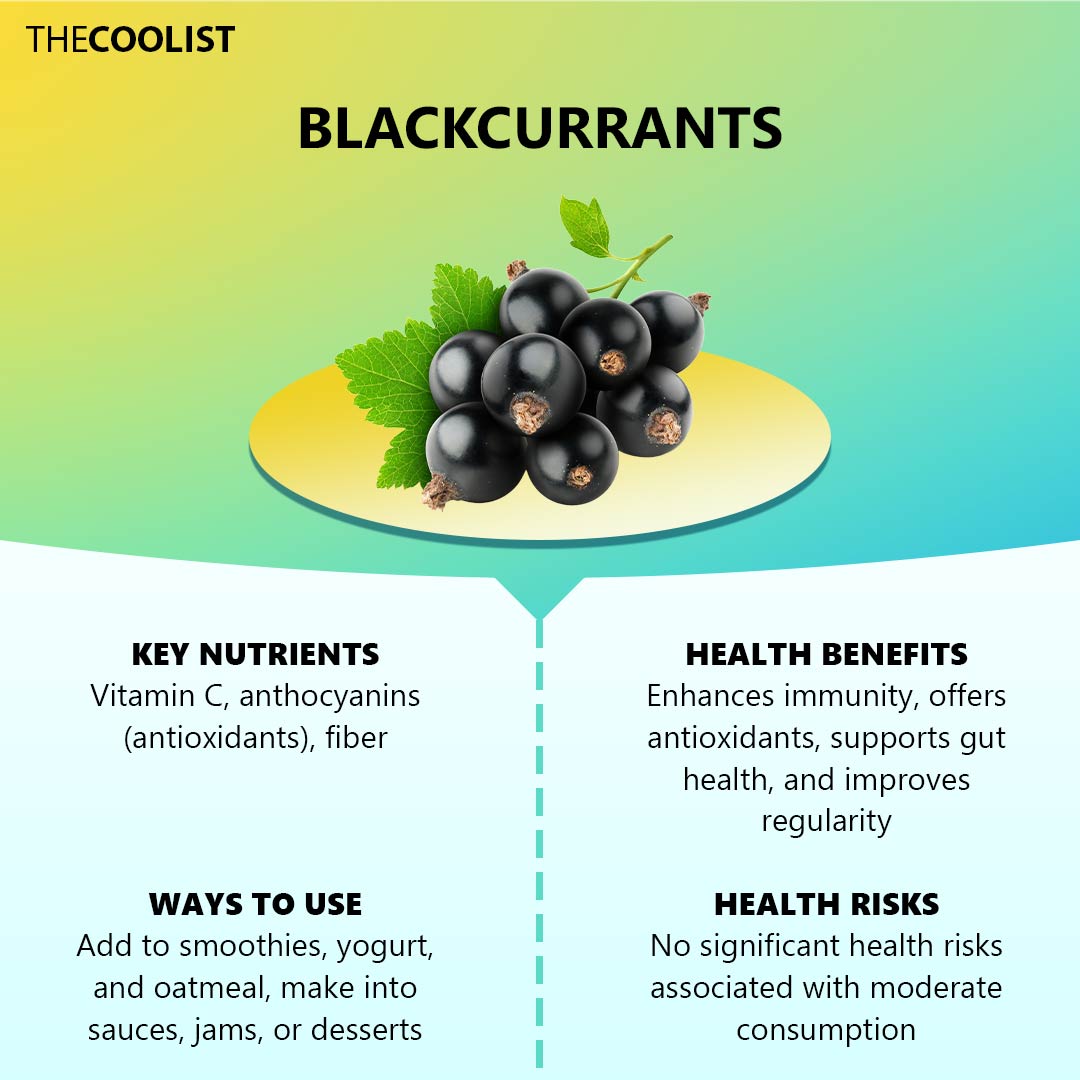
Incorporating blackcurrants into your diet affords three key health benefits. Firstly, blackcurrants are exceptionally rich in vitamin C, which is a powerful antioxidant that protects cells from damage and supports immune function. Moreover, they contain anthocyanins, a type of antioxidant with anti-inflammatory properties. Finally, blackcurrants contain dietary fiber, which promotes gut and cardiovascular health.
You can freely eat blackcurrants – there are no health risks associated with their consumption.
Add blackcurrants to smoothies, yogurt, and oatmeal for a boost of flavor and nutrients. Alternatively, use them to make sauces, jams, or desserts.
When buying blackcurrants, choose plump, firm berries with a deep, vibrant color. Refrigerate them unwashed and use as quickly as possible for maximum freshness.
15. Olives
Olives are small, oval-shaped fruits from the olive tree with a salty and slightly bitter flavor. They come in various colors, including green, black, and purple.
View in gallery
Olives are a rich source of monounsaturated fats, which are thought to improve heart health and reduce inflammation. Additionally, they provide fiber, vitamin E (a strong antioxidant), and iron, which helps transport oxygen in the body.
That said, olives are often high in sodium – especially if cured in brine. To keep your sodium intake low, eat olives in moderation and choose lower-sodium varieties when possible.
Olives enhance dishes with a concentrated punch of flavor. Add them to salads, pizzas, pasta dishes, and tapenades, or enjoy them whole as a snack or appetizer.
When choosing olives, select those olives with smooth, unblemished skin. Store cured olives in their brine in the refrigerator.
How to choose a food to eat every day?
When choosing a food to eat every day, focus on those with high nutrient density, fiber content, healthy fats, and minimal processing. These foods provide your body with essential vitamins, minerals, and antioxidants, and don’t subject it to the harmful compounds that come with processing.
Look for foods packed with vitamins, minerals, and antioxidants. These elements promote various bodily functions and help your body avoid chronic illness. Excellent examples of foods rich in vitamins, minerals, and antioxidants include fruits, leafy greens, berries, cruciferous vegetables, whole grains, legumes, and nuts and seeds.
Additionally, include lots of fiber-rich foods in your diet. These promote digestive and cardiovascular health, regulate blood sugar levels, and increase feelings of fullness. Opt for whole grains, fruits, vegetables, legumes, and nuts and seeds.
Don’t neglect foods containing healthy fats either, as these provide essential fatty acids and support brain health. Healthy examples include avocados, fatty fish such as salmon and mackerel, nuts, and seeds,
Finally, choose whole, unprocessed foods whenever possible. These foods retain their natural nutrients and offer greater health benefits than heavily processed options. The latter are often laden with sugars, sodium, and unhealthy fats.
Some foods are exceptionally nutritious, but maintaining a varied diet is optimal for health. Your dietary needs may also influence the best choices for frequent consumption. For example, you might benefit from eating oats daily if you have high cholesterol while eating more leafy greens will help you manage an iron deficiency. Always consult a doctor or registered dietitian for personalized dietary guidance.
Why is it important to eat healthy food every day?
Eating healthy food every day is important for maintaining health and well-being. A nutritious diet helps prevent illness, raises your energy levels, improves your mental well-being, and boosts the immune system.
Disease prevention is one of the most significant benefits of healthy eating. A diet rich in fruits, vegetables, whole grains, and lean protein provides nutrients that regulate blood pressure and sugar levels, combat inflammation, and support cell health. These benefits reduce your risk of developing chronic conditions like heart disease, type 2 diabetes, certain cancers, and obesity.
Healthy foods help your body sustain high energy levels throughout the day. By eating nutrient-dense meals, you supply your body with the fuel it needs to power through your daily activities. In contrast, processed foods that are full of sugar and refined carbs cause your energy levels to crash quickly after peaking.
Maintaining a healthy diet promotes better mood and cognitive function. These benefits stem from the nutrients that support brain health and the gut-brain connection. Moreover, eating healthy food boosts your immune system and helps fight off infections and illnesses. Vitamins and antioxidants boost the function of your immune cells to shore up your body’s defenses against pathogens.
Is cheese not a healthy food?
Whether or not cheese is healthy depends on the type of cheese, portion size, and your overall dietary patterns. Cheese offers some nutritional benefits, but presents certain risks, too.
Cheese is rich in calcium, protein, and vitamins B12, A, and K2. Calcium is essential for strong bones and teeth. Meanwhile, protein helps build and repair tissues, and vitamin B12 aids energy production and red blood cell formation. Finally, vitamins A and K2 boost immune health and bone health, respectively.
However, three elements present in cheese may pose a health risk. Firstly, many cheeses are high in saturated fat, which raises LDL cholesterol levels when consumed in excess and increases the risk of heart disease. Secondly, cheese is high in sodium, which raises the blood pressure. Finally, cheese is calorie-dense, meaning that it packs a great number of calories in a relatively small portion and contributes to weight gain.
However, there are many different types of cheese, and some varieties are healthier than others. Fresh cheeses like mozzarella and ricotta have fewer calories and less fat compared to aged cheeses like cheddar and Parmesan. The lower calorie and fat content makes these cheeses a healthier option.
How can healthy foods help increase energy?
Healthy foods increase and sustain energy levels in four ways.
Firstly, healthy foods such as whole grains, fruits, vegetables, and legumes are high in fiber. Fiber slows digestion and prevents blood sugar spikes and crashes that lead to fatigue and lethargy.
Secondly, complex carbohydrates in these foods provide your body with long-lasting fuel because they take longer to break down than simple carbohydrates.
Moreover, healthy foods also supply your body with essential vitamins and minerals that are critical for energy production. For example, B vitamins convert food into energy, while iron transports oxygen throughout the body and fuels cellular processes. A diet that lacks these nutrients leaves you feeling fatigued.
Finally, healthy fats from avocados, nuts, and fatty fish provide a concentrated source of calories to fuel your body’s activities. Additionally, these fats support hormone function, which helps maintain energy levels.
Water is not technically a food, but adequate hydration helps sustain high energy levels, while dehydration disrupts your bodily process and makes you tired.
What are some weird food facts?
Below are 5 weird facts about food that might surprise you.
- Ketchup was medicine: In the 1830s, ketchup was sold as a medicine that was claimed to cure ailments like diarrhea and jaundice.
- Carrots come in different colors: Orange is the most common color for carrots, but they were originally cultivated in a variety of colors, including purple, yellow, and white.
- Honey lasts forever: Honey is one of the few foods that never spoils due to its unique composition and acidity. Archaeologists have found pots of honey in ancient Egyptian tombs that were still perfectly edible.
- Bananas are radioactive: Bananas contain naturally occurring potassium, including a small amount of a radioactive isotope. Don’t worry, though – you’d have to eat hundreds of bananas in a short period to get even close to a harmful radiation dose.
- Watermelons can be cubes: In Japan, farmers have developed a technique for growing watermelons into cubes for easier storage and transportation.
Is drinking coffee healthy?
Whether drinking coffee is healthy depends on the quantity consumed, individual sensitivities, and how the coffee is served. Coffee consumption has been linked to some health benefits, but you should consider potential drawbacks to minimize health risks.
Below are the four benefits of coffee consumption.
- Improved cognitive function: Moderate coffee consumption improves alertness, focus, and cognitive performance. Studies suggest that coffee may also offer protection against age-related cognitive decline.
- Reduced disease risk: Research links coffee consumption to a reduced risk of diseases such as type 2 diabetes, Parkinson’s disease, and some types of liver disease.
- High antioxidant content: Coffee is a significant source of antioxidants, which protect cells from damage caused by free radicals. Countering free radicals reduces inflammation and lowers the risk of chronic diseases.
- Boosted metabolism: The caffeine in coffee temporarily increases metabolism and fat burning. That said, these effects diminish with long-term regular use.
However, the following four health risks are associated with coffee consumption:
- Caffeine sensitivity: Some people are more sensitive to caffeine than others. If you have caffeine sensitivity and drink lots of coffee, you may experience anxiety, restlessness, insomnia, and digestive issues.
- Pregnancy: Moderate caffeine intake is generally safe during pregnancy, but high amounts increase the risk of miscarriage. Consult a healthcare provider for personalized recommendations.
- Interactions with medications: Coffee interacts with certain medications. Ask your doctor if coffee is safe to drink if you take prescription medications.
- Added sugars and creamers: Specialty coffee drinks are often laden with sugar and calories. These turn a healthy drink into an unhealthy indulgence.
